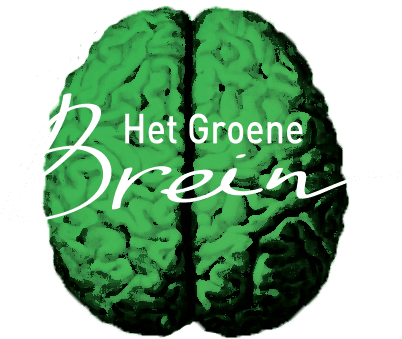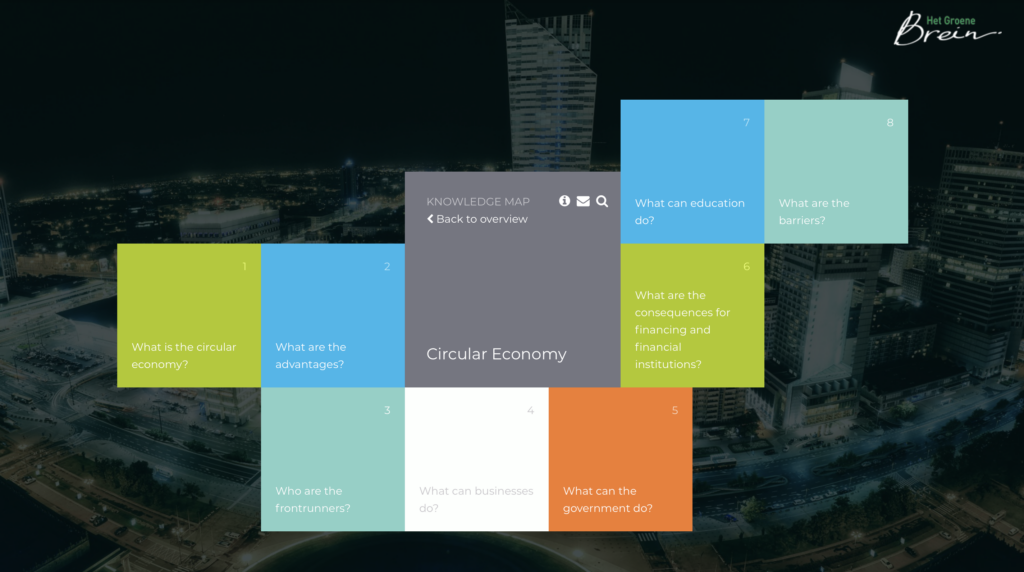How Dutch knowledge institutes can inspire and help in the transition to a Circular Economy
July 29, 2019
By: Antoine Heideveld and Chris van Assen, Het Groene Brein
Dutch knowledge institutes and circular knowledge partners offer many opportunities for international cooperation towards a global Circular Economy. A number of countries is currently preparing policy plans for a circular economy, while businesses worldwide are taking steps towards circular business models and practices. Here, Dutch parties can offer much added value through the knowledge gained in the Netherlands.

Going Circular
Now, more than ever, we are confronted on a daily basis with the harsh consquences of our current linear economic model. Declining biodiversity and diminishing natural resources – including the related conflict situations in many parts of the world – the growing garbage belt of plastics and the energy and climate crisis. The linear model clearly fails both people and the planet.
Why a Circular Economy?
A circular economy provides a sound and solid alternative for our linear model. A circular economy is an economy without waste. An economy that is focused on the optimal use and reuse of resources. An economy in which companies use raw materials better and smarter, turn used raw materials into new products and design products in such a way that they can easily be taken apart, to reuse the separate parts. A circular Economy is an economy in which companies are rewarded for products that are built to last while offering entrepreneurs new opportunities. Yet: our world economy is only 9.1% circular[1]. So what is needed, is a huge system change.
Going circular
Working together towards this new economic system, we need to rethink the key principles that have been at the basis of our economic (and social) system for so long. As Einstein once famously noted: ‘We cannot solve our problems with the same thinking we used when we created them’. The Circular Economy requires new insights. Around materials, properties and reusability. Virtually every product that we see around us, needs to be redesigned – maybe with materials that don’t even exist yet. Companies must develop new service and finance models, such as ‘Product as a Service’ (PaaS). Investors must rewrite their risk and return on investment models. It requires the government to review its laws and regulations.
The role of knowledge parties is essential in this phase of the circular economy that we are currently in. And not only from a scientific point of view, but also practically. We need to work hands-on, with concrete cases, with concrete tools, learning as we go. Building the bridge as we walk on it (free to Robert Quinn).
The Netherlands as a circular knowledge hub
The Netherlands has a rich variety in knowledge institutions that already can provide, or are currently developing, this scientific and practical knowledge. We have excellent infrastructure, major ports and logistics. This creates the right conditions for a circular economy. Moreover, many raw materials are transported via the Netherlands, which makes our country a suitable ‘resource roundabout’[2].
Current knowledge development in the Netherlands
Dutch Universities, Universities of Applied Sciences and other institutions are moving fast forward on their knowledge about materials, Life Cycle Analyses (LCAs), new business and revenue models and recycling. A challenge we face here, is the coherence in knowledge development. We have parties that focus on fundamental research, parties that perform mostly practical research and parties that are largely concerned with applications in practice. These various parties are usually organized separately and coherence is not always present. Het Groene Brein works together with Holland Circular Hotspot, the knowledge institutes, companies and governments to create more interdisciplinarity, to stimulate cross sectoral approaches and to bridge the gap from theory to practice.
Where to start…
At the request of Holland Circular Hotspot, Het Groene Brein has made an overview of the key Dutch knowledge institutes working on the Circular Economy. You can find the overview here. For example, Wageningen University has great knowledge in the field of biobased materials and their applications. TU Delft is developing strong expertise on the design of the circular economy. And Radboud University has a strong group of scientists working together on new business and revenue models. In short, enough knowledge is available to already apply to companies and governments. So that together we can make the transition to the circular economy.
Tools towards circularity
Wanting to get started yourself with accelerating the transition towards the circular economy, as a company or government? There is also an overview of the specific tools available that can support you in informing yourself and taking concrete steps. For example, by mapping raw material flows through a circle scan. Or showing which materials are in a building, for example, by means of a materials passport. Wanting to know more? You can find this overview with tools here.
Thinking together, out of the linear box
Joining forces, nationally and internationally, is essential for the transition towards a Circular Economy, as the challenges that come with it are unprecedented. Therefore, this transition has the potential to unite people and stimulate entrepreneurship, innovation and collaboration. It provides a clear set of principles which, when implemented soundly, will contribute towards reaching the Sustainable Development Goals and the Paris Agreement. The circular economy is where we want to go.
Together we can make the transition to the Circular Economy. Wanting to know more? To get in touch with one of our institutes? To start applying a tool? Follow a MOOC? Get in touch! You can find us here: Het Groene Breinand Holland Circular Hotspot.
[2]PBL Themesite on Circular Economy

